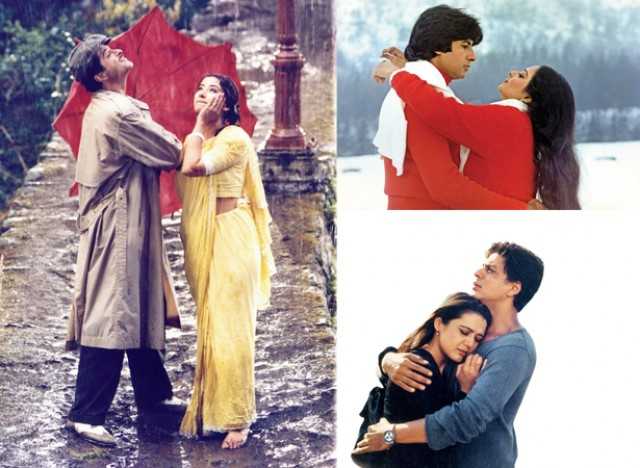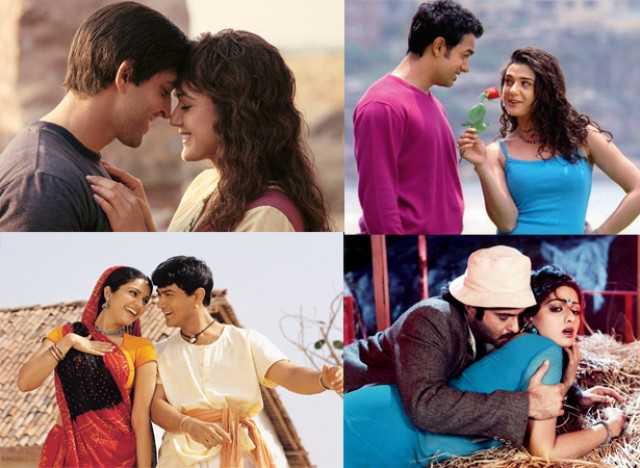Ye kahan aa gaye hum from Silsila (1981) is one of the most romantic Hindi film songs ever. The free verse incorporated in the song, “Main aur meri tanhai, aksar yeh baatein karte hain…” heard in Amitabh Bachchan’s rich baritone, takes it to a new level. The lines burn with the pathos of unrequited love, Majboor yeh halaat idhar bhi hai, udhar bhi/tanhai ki ek raat idhar bhi hai, udhar bhi… and say it all. You can close your eyes and experience the pain.
And to think that Javed Akhtar became a lyricist purely by accident. Yash Chopra, who mostly worked with Sahir Ludhianvi, was looking for a worthy replacement after Sahir’s death in 1980. Chopra had worked with the Salim-Javed team of scenarists since Deewaar (1975) and knew that Akhtar dabbled in poetry. He requested him to try his hand at writing the lyrics for his film revolving around an extramarital affair. The rest is history.
It was not as if Aktar was impervious to poetry. In fact, he belongs to a family of poets ranging back seven generations. His father, Jan Nisar Akhtar, was a noted poet/lyricist. Legendary Urdu poet Majaz was his maternal uncle and the works of his grandfather, Muzter Khairabadi, are considered as a milestone in Urdu poetry. A young Akhtar grew up reading the choicest poetry in a house full of books and knew hundreds of couplets by heart. He showed an inclination towards writing poetry since an early age and began winning competitions, representing his school and later college.

Why he carved out a career as a scenarist and not a lyricist is a mystery. Apparently, he had a deep rooted angst against his father for marrying again and didn’t reach a rapprochement with him till his last days. That resentment reportedly led him to forsake poetry. He picked up the pen again after his father’s demise in 1976 to affect a catharsis and continue his lineage.
Silsila was full of odes to love like Ye kahan aa gaye hum, Dekha ek khwab and the imagery ridden Neela aasman kho gaya. Saath Saath (1982) was parallel cinema, an urban romance rooted in reality. Akhtar’s lyrics reflected the pain of relationships dying in the battle for survival. Success of songs like Pyar mujhse jo kiya tumne, Yeh tera ghar yeh mera ghar and Tumko dekha toh yeh khayal aaya ensured he was no one-hit wonder. The songs were sung by Jagjit Singh and Chitra Singh and composed by Kuldeep Singh. A lifelong friendship between the ghazal singer and the lyricist led to collaborations for two private albums Silsilay (1998) and Soz (2002).
The ‘80s can be said to be journeyman years for the lyricist. He used his acumen of writing scenes to pen songs that took the story forward. Songs like Zindagi aa raha hoon main from Mashaal (1984) or the infectious Mammayea kero kero kero mama (Arjun,1985) are examples of that. With Arjun, he formed a fruitful partnership with RD Burman. Saagar (1985) – composed by RD was the comeback film of Dimple Kapadia. Javed produced memorable songs like Chehra hai ya chand khila hai, Sagar kinare, Jaane do na, and Sach mere yaar hai for this love story. Later, 1942: A Love Story won him his first Filmfare Award as a lyricist for the song Ek ladki ko dekha to aisa laga. Sung by Kumar Sanu, the song did away with the traditional mukhda-antara method, having just one line – Ek ladki ko dekha to aisa laga – technically as the mukhda. The rest of the lines served as the antaras. Similarly, in1988, he experimented with the song Breathless, written for Shankar Mahadevan’s album of the same name. The six-minute song flowed like free verse, without the demarcation of mukhda and antara.
The ‘90s saw him score some of the most romantic songs of his career in Papa Kehte Hain (1996). A small-budget film, it got a boost due to Aktar’s soulful lyrics and stirring music by Rajesh Roshan. Ghar se nikalte hi got Akhtar his second Filmfare trophy. Other memorable songs were Pyar mein hota hai kya jaadu, Pehle pyar ka pehla gham and Mujhse naraaz ho to ho jao. Border (1997), a war film by JP Dutta, held the message of peace. Akhtar’s Mere dushman, mere bhai sung by Hariharan, highlighted that. Sandese aate hain spoke about the homesickness of soldiers. The album won him yet another Filmfare trophy.
The new millennium saw him scoring high with Refugee (2000). His collaboration with Anu Malik produced such gems as Panchi nadiya pawan ke jhonke, Aisa lagta hai and Mere humsafar. It won him a Filmfare Award too. Lagaan (2001) saw him team up with AR Rahman for the first time. The film was set in the 19th century and required the lyricist to approximate the language of that era. The rain song, Ghanan ghanan, the bhajan O palanhare, the fun songs, O re chori and Radha kaise na jale or the team building anthem, Mitwa, all had a colloquial flavour. He made a jump from period to contemporary with son Farhan Akhtar’s Dil Chahta Hai, where frothy lyrics like Dil chahta hai, Koi kahe kehta rahe and Woh ladki hai kahan showcased his synergy with the youth.
Mention must also be made of Shyam Benegal’s Zubeida (2001), where Javed came together with AR Rahman once again. In the ill-fated love story of an actress-turned royalty, Javed’s pen covered the entire spectrum of emotions. Mehendi hai rachne wali spoke of bridal dreams, Dheeme dheeme gaaon of the first flush of love, Mehki mehki hai raahein of togetherness and So gaye hain kho gaye hain – the most haunting – was all about dreams succumbing to reality.
The OSTs of Main Hoon Na (2004) and Kal Ho Naa Ho (2003) were fresh off the farm too. Songs like Tumhe jo maine dekha, Chale jaise hawaein, as well as the title song from the former and Har ghadi badal rahi hai, Mahi ve, It’s the time to disco, Kucch to hua hai from the latter were chartbusters. He composed to late Madan Mohan’s tunes for the cross-border romance Veer-Zaara (2004) and gave gems like Tere liye, Do pal and Main yahan hoon. Swades (2004) saw him in a sombre mood with songs like the bhajan Pal pal hai bhari, the road song, Yun hi chala chal rahi and the inspirational Yeh tara woh tara. In Kabhi Alvida Na Kehna (2006), he had the crowd grooving to Rock n roll soniye and Where’s the party tonight.
Trust him to coin new terms, which he did with Dard-e-disco in Om Shanti Om (2007) , giving a modern twist to the ghazal. His classical leanings came into play in Jodhaa Akbar (2008), where he lent the 16th century ethos into the lyrics of this period romance. The marching song Azeem-o-shaan shahenshah and the Sufi ghazal Khwaja mere khwaja were the pick of the lot.
Wake up Sid (2009) saw him going into the Sufi mould with Iktara. In Zindagi Na Milegi Dobara (2011), he chalked out his philosophy of life in the poem Toh zinda ho tum. Songs like Dil dhadakne do and Senorita were crowd favourites too. In Dil Dhadakne Do (2015) his Girls like to swing and Galla goodiyan got much appreciation. Very much connected to today’s tastes and tunes, he’s all set to conquer more fans with upcoming films like Raees and Mohenjo Daro.

Top 10 songs
1 Dekha ek khwab
Film: Silsila (1981)
Music: Shiv-Hari
Singers: Kishore Kumar-Lata Mangeshkar
2 Tumko dekha to yeh khayal aaya
Film: Saath Saath (1982)
Music: Kuldeep Singh
Singers: Jagjeet Singh-Chitra Singh
3 Chehra hai ya chand khila hai
Film: Saagar (1985)
Music: RD Burman
Singer: Kishore Kumar
4 Ek do teen
Film: Tezaab (1998)
Music: Laxmikant-Pyarelal
Singer: Alka Yagnik
5 Ek ladki ko dekha to aisa laga
Film: 1942: A Love Story (1994)
Music: RD Burman
Singer: Kumar Sanu
6 Sandese aate hain
Film: Border (1997)
Music: Anu Malik
Singer: Roop Kumar Rathod, Kumar Sanu
7 Panchi nadiya pawan ke jhoke
Film: Refugee (2000)
Music: Anu Malik
Singer: Sonu Nigam
8 Koi kahe kehta rahe
Film: Dil Chahta Hai (2001)
Music: Shankar-Ehsaan-Loy
Singers: Shankar Mahadevan, Shaan, KK
9 Dard-e-disco
Film: Om Shanti Om (2007)
Music: Vishal-Shekhar
Singers: Sukhwinder Singh, Caralisa Monteiro
10 Iktara
Film: Wake Up Sid
Music: Amit Trivedi
Singers: Kavita Seth, Amitabh Bhattacharya